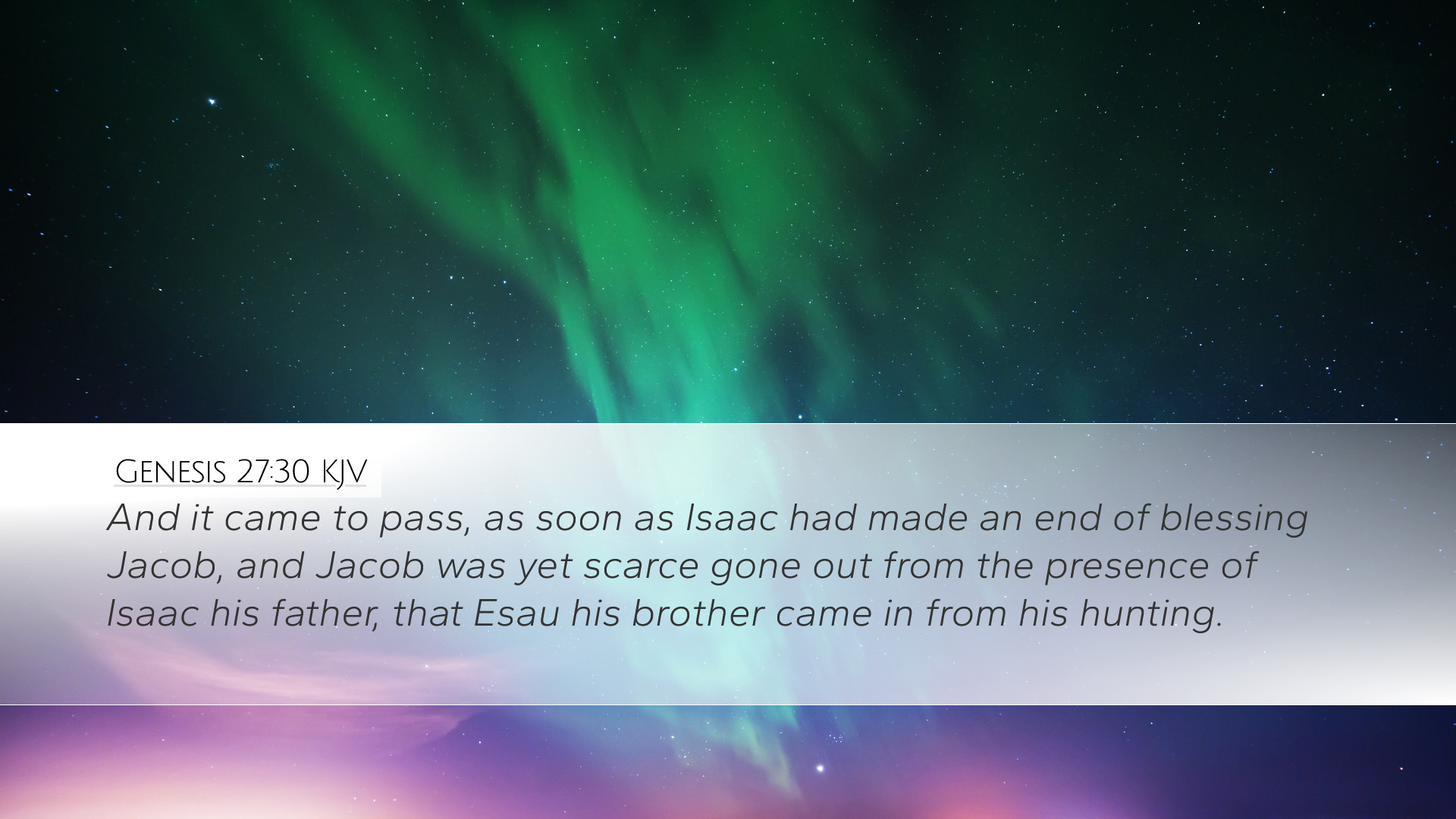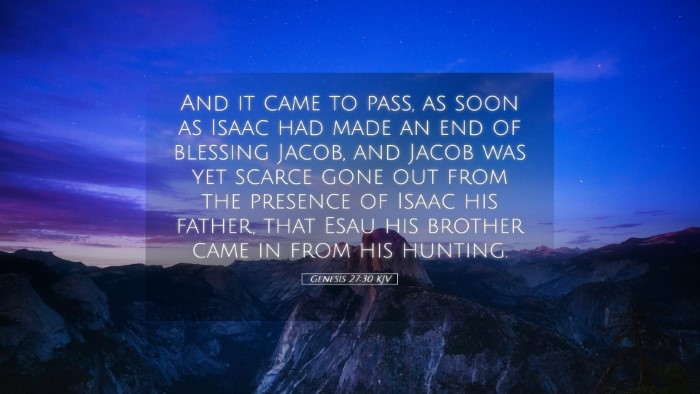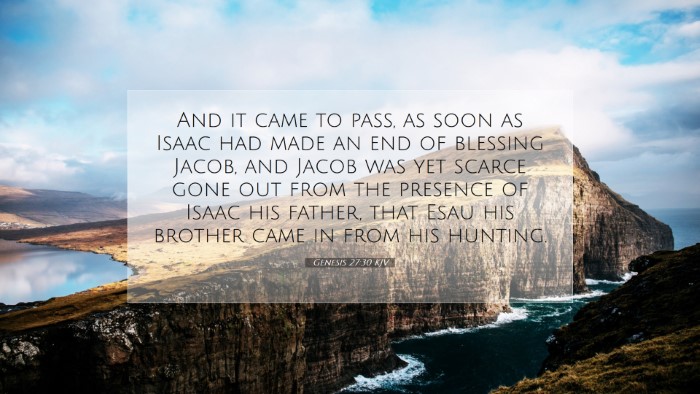Commentary on Genesis 27:30
Verse: "And it came to pass, as soon as Isaac had made an end of blessing Jacob, and Jacob was yet scarce gone out from the presence of Isaac his father, that Esau his brother came in from his hunting." (Genesis 27:30)
Context and Setting
This moment occurs in a significant narrative in the life of Jacob and Esau, illustrating the themes of deception, family conflict, and divine providence. The stage is set in the patriarchal family where Isaac is now old and nearly blind, and Rebecca, his wife, conspires with Jacob to steal the blessing intended for Esau.
Insights from Commentators
Matthew Henry's Commentary
Matthew Henry reflects on the providential timing of events in this passage. He emphasizes that Jacob's departure from his father occurs just as Esau arrives, highlighting a divine orchestration in the narrative. Henry points out that Isaac, though blind, symbolizes spiritual blindness as he is deceived by the favored son, Jacob, whom Rebecca clothed in Esau’s garments to secure the blessing.
Henry notes the moral implications of Jacob’s actions. While his obtaining the blessing fulfills the prophecy given to Rebecca (Genesis 25:23), it also reveals the consequences of deceit and family strife. The commentary encourages readers to reflect on how human actions can intersect with divine plans.
Albert Barnes' Notes on the Bible
Albert Barnes adds historical and theological context, reminding us that the blessings were not merely rites but held profound spiritual significance. Barnes explains that Isaac’s blessing had implications for the lineage of the covenant, and Jacob’s receipt of it symbolizes the broader themes of God’s sovereignty and election. He emphasizes that Esau’s return signifies a moment of tragedy; he unwittingly comes too late to reclaim what is rightfully his in a cultural context where blessings were irrevocable.
Moreover, Barnes points to the character of Isaac, reflecting on his love for Esau and how it clouds his judgment. His commentary suggests that parental favoritism leads to deep-seated familial conflict, challenging leaders and parents to consider their own biases and the long-term effects on their family.
Adam Clarke's Commentary
Adam Clarke examines the implications of the immediate aftermath of the blessing. He notes the urgency and chaos of the moment—Jacob leaving in haste and Esau entering moments later—creating a collision of destinies. Clarke interprets this as an illustration of irony; while Jacob gains the blessing through cunning, he must later flee from Esau’s wrath, suggesting that the blessings obtained through deceit may lead to future peril.
Clarke also addresses the cultural significance of the blessing itself. It was deeply embedded in the customs of the time that once pronounced, it could not be retracted, demonstrating the weight of Isaac’s words. This reinforces the lesson of the covenant's seriousness and God’s ultimate authority in fulfilling His promises.
Theological Reflections
Theological insights from this passage serve to remind modern readers, including pastors and students, of the complexities involved in God’s plans as they unfold through human actions, both righteous and sinful. The story of Jacob and Esau provides a rich tapestry through which to explore themes of grace, conflict, and ultimate redemption. Despite Jacob’s sin, God’s purpose prevails, reminding believers of the sovereignty of divine will even amid human folly.
Moral and Ethical Considerations
This incident challenges readers to consider the ethics of their actions. Jacob’s story is not one of heroic virtue but rather a narrative steeped in deception and the consequences of ambition driven by fear. It asks contemporary audiences to reflect on their moral decisions, especially within familial relationships, highlighting the need for integrity, honesty, and reconciliation.
Application for Today
- Lessons on Deception: Leaders and individuals are called to be wary of deceit in pursuit of their goals, understanding that integrity is paramount in all relationships.
- Understanding Divine Sovereignty: Regardless of circumstances, God can and will fulfill His plans, often in ways that surpass human understanding.
- Parental Guidance: Parents must be cautious of favoritism, ensuring they nurture all their children equally, lest they provoke rivalry and strife.
- The Call to Repentance: When wrongs have been done, it is essential for individuals to seek repentance and restoration, understanding that God can redeem broken familial bonds.
Conclusion
The drama of Genesis 27:30 is rich in narrative depth and spiritual implication. For pastors, students, and theologians examining this passage, the interplay of human agency and divine providence serves as an enduring lesson on the nature of God’s ultimate control in the affairs of mankind, the consequences of moral choices, and the profound need for grace in the face of human failure.


